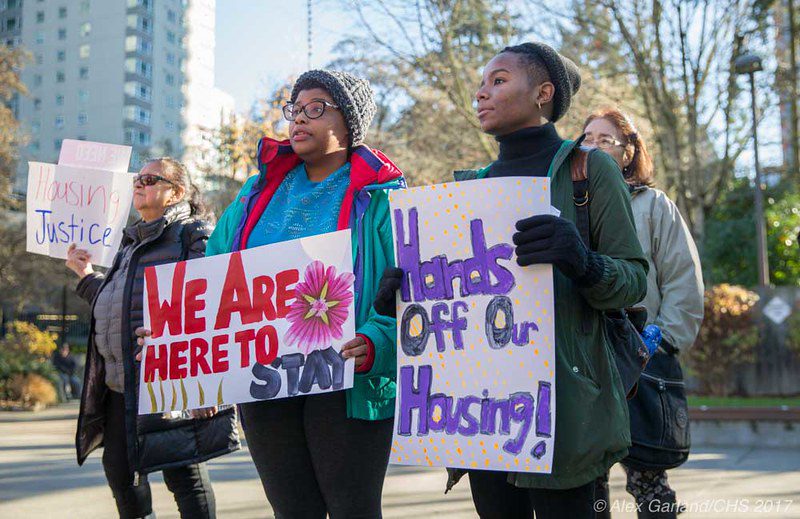
Ever since the COVID-19 crisis, this country has been debating its many dysfunctions, like a family trying to face its deeply unresolved core problems. The temporary solutions that have been implemented by Congress and statehouses reveal the severity of America’s underlying issues with food insecurity, child care and housing.
The congressional CARES ACT enacted at the beginning of the crisis established a national rental eviction moratorium. But now it’s expired, terminating both the eviction moratorium and an extra $600 unemployment supplemental benefit. And Mitch McConnell’s Senate is still scheduled to leave the building for August recess by the end of the week as millions prepare to miss their monthly payments.
The situation “looks scary for renters” says Matt Desmond of Princeton University’s Eviction Lab, a national database tracking evictions, predicting mass evictions accompanied by rising homelessness in a period of unregulated chaos. He notes “Some landlords are going to negotiate with their tenants, but others are going to reach for that eviction notice.”
Like millions around the country, I find the very subject of housing, skyrocketing rents and evictions triggering. It upsets me to think about one person losing a safe place to call home, or one person sleeping in their car, because I relate in a deep, intimate way with everyone who may have to cope with this nightmare scenario.
I flashback on the number of times I have suffered through bad roommates to help subsidize rent, received a one month notice, or sold valuables — including my car — to pay rent. The word “landlord” itself triggers me, with its associations with cruel masters with the power to bulldoze the lives of families and children with just a 30-day notice.
I am not unusual. Fear surrounding just marginally maintaining housing or losing it altogether is the 21st century American way. It’s no wonder that eight of every 10 adults agree that housing insecurity is a national crisis.
Six in 10 Americans say they couldn’t afford an additional $500 monthly expense, while 1 in 4 low income households spend 70 percent of their income on rent and utilities. Housing has been unaffordable in the United States for decades as wages have stagnated. It’s a crisis that was hard to imagine getting worse — and then the pandemic hit. Since then, an unprecedented number of people have lost their jobs and ability to provide for their families without federal assistance. Now many will face having a safe place to social distance taken from them, too.
But the silver lining is that this situation is finally making our housing crisis a national talking point and lifting up the struggles Black and brown families in particular have been facing. There is a national desire to radically rethink housing. Findings recently collected by Community Change for a Housing Justice Narrative Initiative show a vast commitment to major reform. Ninety-two percent of Americans concurred that “Like air to breathe and food to eat, safe shelter is a basic human need.”
If a world with universal affordable housing is pie-in-the-sky fantasy, it’s a dream shared by many of us. When asked, people agreed that housing is a human right. There is a disconnect between what we believe, and how we live — and the federal government has the opportunity to bridge that gap.
Certainly, money in politics has stymied change. But I also think reform is delayed by a vast social conundrum. It’s a psychological mechanism that’s reinforced by the hierarchical structure of the housing totem pole, with middle-and-low-income renters. and the homeless at the bottom. Society ties our personal value to our economic clout. and conservative propaganda tells us if we can’t make it in a capitalist society, it’s our own fault. That’s why although we believe housing is a human right, we still blame ourselves when we face systemic barriers to keeping a home in a neighborhood where our children enjoy growing up and our elders enjoy growing old.
I can speak for this notion myself. If the phone rings, and I see on the machine it’s my landlord, I sometimes tremble. I literally shiver, having been indoctrinated in habits of silence, submission and coerced agreement. Although I know my rights, I will tend to make big allowances to the landlord. If he asks for extra time to fix a leak, for example, I will agree to it. I may have an enforceable lease, but I have little confidence in a system under which I have already suffered so many small sleights that it has been beaten into my head that the property I rent holds more value than my life.
People like myself can be shuffled from place to place, at the whim of the market, not uncommonly accepting substandard lodging where we pay inflated sums based on arbitrary property values. Low-income renters have little self-esteem because they have little economic clout. Homelessness in this social hierarchy equates to uselessness and worthlessness. In other words, we end up feeling like we don’t deserve a home, even if deep down we know we do.
This kind of system-inflicted self-doubt stymies political progress because we don’t recognize the power we hold. But in fact, a national movement to enact affordable housing policies led by those of us who have faced housing insecurity, is possible. And with the Housing Justice Narrative Project, it’s beginning to take shape.
The COVID19 pandemic, the looming economic crisis, the real threat of mass evictions and an election around the corner have signaled a time when major movements do demand attention — just look at the Black Lives Matter movement. Let’s stand firm together that housing is a human right and demand a change. It’ll be our promise to future generations that we hold value and deserve dignity.
Darryl Lorenzo Wellington is a Communications Fellow at Community Change